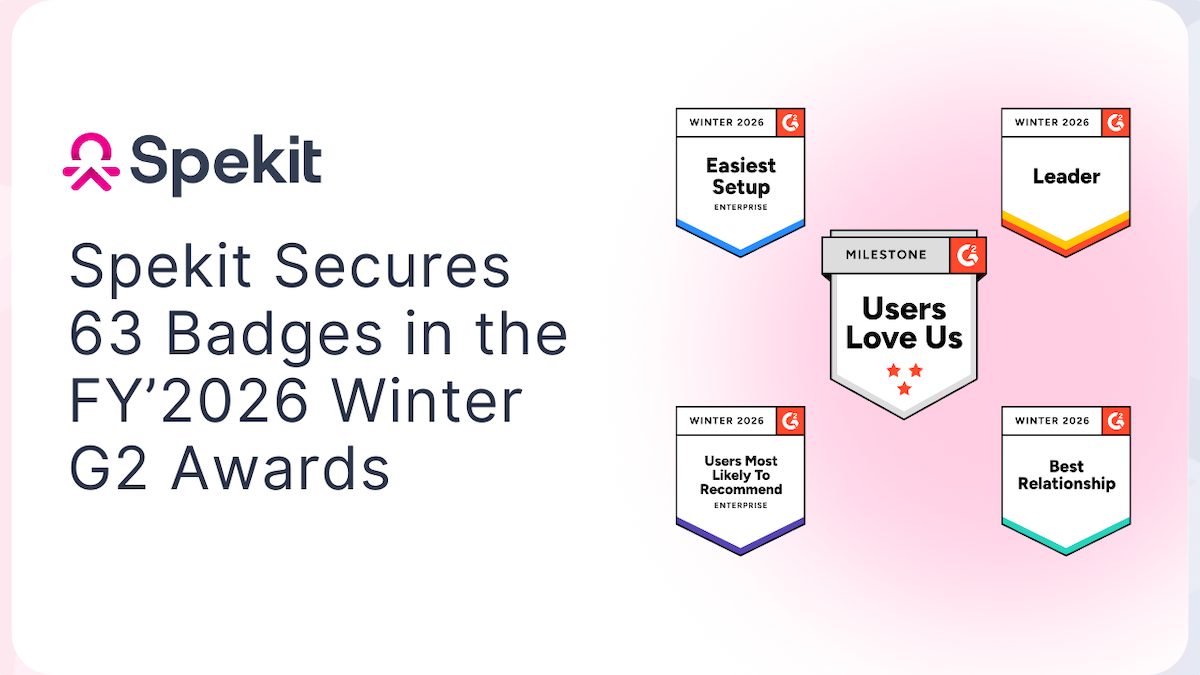The world of sales has rapidly evolved. In the last few years, the transition to remote/hybrid working has increased the number of tools and processes that a sales team uses to collaborate and communicate. In addition, sales reps are expected to onboard quickly so they can achieve quota fast. To do this, they must be successful in learning the products they are selling, their company’s processes and tools, and be adequately trained in best practices.
All of these increasing demands mean that sales leaders and sales enablement has more on their plates than ever before. Reps depend on you to be successful so they can make their livelihoods.
In The State of Sales Training and Onboarding, Spekit partnered with DemandMetric to conduct third-party research for a better understanding of how we are weathering these changes and mounting pressures. In this post, we’ll take a look at 23 of the most eye-opening sales enablement stats from the research.
Sales onboarding, training, and performance
1. Almost all (94%) of sales leaders report that the hiring and onboarding process is critical or important in enabling reps to hit their targets.
2. Nearly half (47%) of sales reps have left a job due to a poor onboarding experience or lack of training.
3. Only 28% of sales reps report that they always hit their quotas.
4. Only 8% of sales leaders report that most sales rep hires stick around for longer than a year.
5. Top sales performers are 3X more likely than poor performers to report their onboarding experience was good or excellent.
6. Poor sales performers are 5X more likely to report that they aren’t fully onboarded and productive in their role after year one.
Key takeaway
The majority of sales leaders place high importance on training and onboarding and the stats support this importance. Sales churn is at an all-time high and sales leaders cannot be sure of forecasting and achieving quotas if they cannot retain a skilled team trained on processes and best practices.
If reps do not feel they have the tools they need to be successful from their onboarding, nearly half of them will leave.
Sales processes, tools, and enablement
7. The majority of reps spend 3–11 hours per week searching for answers to questions about tools, processes, or information.
8. The majority of sales leaders report spending 4 or more hours each week answering questions about tools, processes, or information.
9. Sales reps report that learning their company’s sales processes and tools is just as difficult as learning the product they are selling.
10. Over half of sales leaders have rolled out a new process in the past 120 days.
11. Only 29% of sales reps would describe the rollout of a new sales process as “excellent.”
12. Only 16% of sales leaders are confident that their reps are following new processes that have been rolled out.
13. The majority of sales teams rolled out more than 2 new tools or technologies last year.
14. Sales leaders report that Salesforce requires the most training of all technologies (34%).
15. 35% of sales reps are unsure about entering data into Salesforce correctly.
16. 52% of sales reps will go to their sales manager for information before searching a knowledge base, an LMS, Slack, etc.
17. Nearly two thirds of sales reps who always or often hit their quotas attribute their success to sales leadership.
Key takeaway
With the shift to remote work, our reps can no longer work from “the buddy system” and shadow a co-worker in order to ramp quickly. Instead, many are feeling left on their own, searching for the information they need through multiple systems.
Even if they are given LMS-style onboarding, it’s unlikely they will retain that knowledge for more than a few days or weeks after training, and then they are on their own.
To make matters worse, sales leaders are constantly rolling out new tools and processes that they must learn and adapt to.
If reps need to search and dig for information, they are likely to just ping their manager with every question and that knowledge is unlikely to be reinforced and adopted.
For reps to be confidently onboarded, they must be able to easily access the information they need, when they need it, with the click of a button.
Delivering an exceptional sales training experience
18. Only 31% of sales reps like to learn by taking online courses (e.g., via an LMS), compared to 75% of reps who want to learn by “doing.”
19. Only one-fourth of sales reps would say their onboarding experience was excellent.
20. 75% of reps report at least one barrier or roadblock to successful onboarding.
21. Top-performing sales reps are 2X more likely to report they can always find answers to questions independently.
22. Fewer than 51% of sales leaders have visibility into what training has been watched and by whom.
23. Sales leaders with high retention rates (>75%) were nearly 30% more likely to retain reps for more than one year when they had deep insights into sales training. Sales enablement analytics provides these critical insights, helping leaders track engagement, measure training effectiveness, and make data-driven improvements to onboarding programs.
Key takeaway
The way we learn at work has changed. Most people prefer to learn by doing, and don’t retain information from classes all that well.
In order for reps to be successful, it’s imperative to design onboarding and training programs that empower the rep to be self-sufficient.
And sales leaders must place importance on how the reps are progressing through training programs to understand if information is going unread, if reps are getting stuck, or if there are gaps in the information that is provided.
Conclusion
The findings from The State of Sales Training & Onboarding undeniably show how much has changed in sales over the past few years, and how many sales leaders and enablers are finding new ways to keep up with the demands in order to create successful sales organizations and reduce churn. It also is clear that the sales leaders and enablers who are not making the necessary changes away from antiquated onboarding and training will inevitably suffer.
To be successful, sales leaders today must:
- Understand the success of current onboarding and enablement programs to identify where improvements are needed.
- Prioritize your training and onboarding programs in your sales strategy.
- Ditch death by PowerPoint and cater to today’s learning preferences of learning by doing to increase knowledge retention.
- Focus on enabling self-sufficiency in a remote work environment by giving your reps access to what they need, when they need it.
- Gather insights and refine your processes.
Learn how Spekit can cut your team’s ramp time in half with just-in-time learning that happens within their flow of work. Schedule a demo today.







